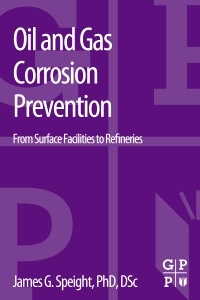Oil and Gas Corrosion Prevention From Surface Facilities to Refineries
Auteur : Speight James G.

Refinery Corrosion-Types of Corrosion
Materials of Construction for Refinery Units-Ferrous Alloys-Other Alloys
Corrosion in Refinery Units-Desalting-Distillation-Coking Units
Fluid Catalytic Cracking Units
Hydroprocesses
Gas Treating Units
Sulfur Recovery Units
Corrosion Monitoring Methods
Sources. He is recognized as a world leader in the areas of fuels characterization and development. Dr. Speight is also Adjunct Professor of Chemical and Fuels Engineering at the University of Utah.
James Speight is also a Consultant, Author and Lecturer on energy and environmental issues. He has a B.Sc. degree in Chemistry and a Ph.D. in Organic Chemistry, both from University of Manchester. James has worked for various corporations and research facilities including Exxon, Alberta Research Council and the University of Manchester. With more than 45 years of experience, he has authored more than 400 publications--including over 50 books--reports and presentations, taught more than 70 courses, and is the Editor on many journals including the Founding Editor of Petroleum Science and Technology.
- Gets engineers and managers up to speed on the latest types of corrosion common for lower grade crude oils and gases
- Provides the best prevention methods for all of the major sections of the refinery, especially desalting and sulfur recovery units
- Covers additional topics such as unique midstream sections, or point of entry to the refinery, as well as major critical refinery equipment
Date de parution : 03-2014
Ouvrage de 150 p.
15x22.8 cm
Thèmes d’Oil and Gas Corrosion Prevention :
Mots-clés :
refinery corrision; alloys; de-salting; distillation; coking units; cracking units; hydroprocesses



